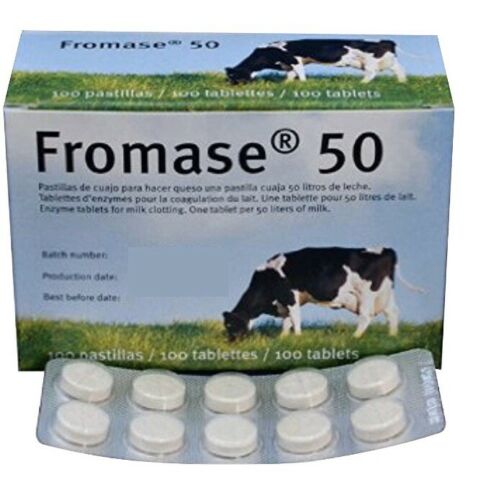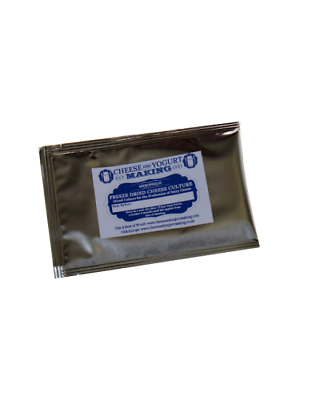-40%
CHEESE CULTURE MA 4001 DIRECT VAT (DVI) IDEAL FOR FETA CHEESE
$ 10.55
- Description
- Size Guide
Description
Choozit MA4001 - for professional results. IDEAL FOR FETA CHEESE, QUARK AND SOUR CREAM.A freeze-dried lactic starter culture for the direct vat inoculation (DVI Culture) of milk and milk bases.
Each sachet contains 5DCU, enough to inoculate up to 13- 26 US Gallons (50 - 100 liters) of fresh milk, and is designed essentially for the manufacture of soft cheeses and in particular is suited to the production of Feta. It can also be used for other soft and semi-hard cheeses, as well as for producing quark and sour cream.
The product dosage is 1 sachet (5 DCU) per 13- 26 US Gallons (50 - 100 liters) milk for both soft and semi-hard cheese. For the production of sour cream or quark, 1 sachet is enough for 26-52 US Gallons (100 - 200 liters) of milk.
The use of starter rotation is crucial for the control of phages and it is advisable to alternate between Choozit types MA4001 and MA4002 when making cheese on a regular basis (the culture MA4002 is also available on our website).
Description: Heterofermentative farmhouse culture with a mesophilic predominance plus a thermophilus culture for quicker acid production. It comprises Lactococcus lactis subsp. lactis + Lactococcus lactis subsp. cremoris + Lactococcus lactis subsp. lactis var. diacetylactis + streptococcus thermophilus.
Storage: Keep sachets refrigerated at 39 degrees Fahrenheit (4°C) maximum.
Please note that these sachets are sold and priced individually.
Bacteriophages
Bacteriophage infection of starter cultures can be a major problem. Continual use of the same starter strain (or the same multiple-strain culture) can allow phage numbers in a cheese factory to rise to levels that cause a significant reduction in bacterial cell numbers. Reduced cell numbers lead to a reduced overall rate of acid production, longer manufacturing times and also poor flavor development owing to the fermentation of excess milk lactose by adventitious microflora.
The commercial consequences of phage infection include disruption of production schedules, reduction in product quality (and reduction in commercial value) and, in the most severe cases, abandonment of production. Strategies for reducing the impact of bacteriophage infections in cheesemaking have been very successful in diminishing the overall production and financial losses associated with this problem. Improved factory design, aseptic propagation of starter cultures and better selection of starter strains have been major advances.
However, phages continue to be introduced into dairy factories (pasteurization of milk does not eliminate phages), and there is always a chance that these phages will infect starter bacteria. Therefore, successful management of the phage problem continues to demand constant monitoring of the factory environment for phages. Starter strains are not all infected by the same phages; i.e. strains differ in their phage sensitivity and phages differ in which starter strains they can infect.
The use of starter rotations is a crucial phage-control measure. The strains in each mixed culture differ in their phage-sensitivity from each other and from the strains in the other cultures. Strains infected by highly-virulent phages should not be used. Reliable data on the phage population of each factory is essential for this strategy to succeed.
Instructions For Use of MA 4001








